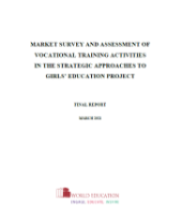The Strategic Approaches to Girls’ Education (STAGE) project aims to support marginalized girls to improve their lives through education by achieving and acquiring literacy and numeracy skills; relevant knowledge, skills and attitudes needed for life and work.
By December 2020, STAGE had trained about 3,000 highly marginalized adolescent girls who had never been to school or who had dropped out of school before grade 4 in seven regions in Ghana in many vocations. The vocational skills training (VST) include income-generating activities such as Kente weaving, smock sewing, pastries, bread-baking, soap-making, beaded materials, hair braiding, and cosmetics, among others.
STAGE conducted a market survey to identify the viability of the vocational skills training options and potential markets for skills that are worth promoting. Moreover, there was a need to identify the gaps in the demand and supply of basic goods and services in beneficiary communities.
Findings indicated that most communities lack suppliers or providers for such services or goods and that the demand for income-generating activities (IGA) products is strong. The results also show that, on average, most IGAs will be in high demand in the fourth quarter of the year, especially in the northern part of the country. However, since these are daily-demanding products, demand for products such as pastries and soap-making would be reasonably strong during the year.
In terms of IGA product profitability, all IGA products are profitable. The study also revealed that most of these IGAs need a relatively small amount of money (about GH¢200 – 250) to begin on a very small scale, usually from the beneficiaries' homes. However, since the fixed capital for these IGAs is relatively costly, IGAs such as Kente weaving, bread baking, and smock sewing require relatively large seed money to get started. Based on these results, the report suggests a mixed approach to seed money distribution to the girls: individual for those engaged in IGAs such as pastries, soap-making, and sandals, and group for those engaged in Kente weaving.
Going forward, the report suggests beneficiary post-disbursement management. This include linking these girls to input and output markets, ensuring financial inclusion, and providing postdisbursement training in areas such as basic financial management and group dynamics. Furthermore, strict and regular supervision of the girls' business and finances is important for the STAGE project's longterm viability.


